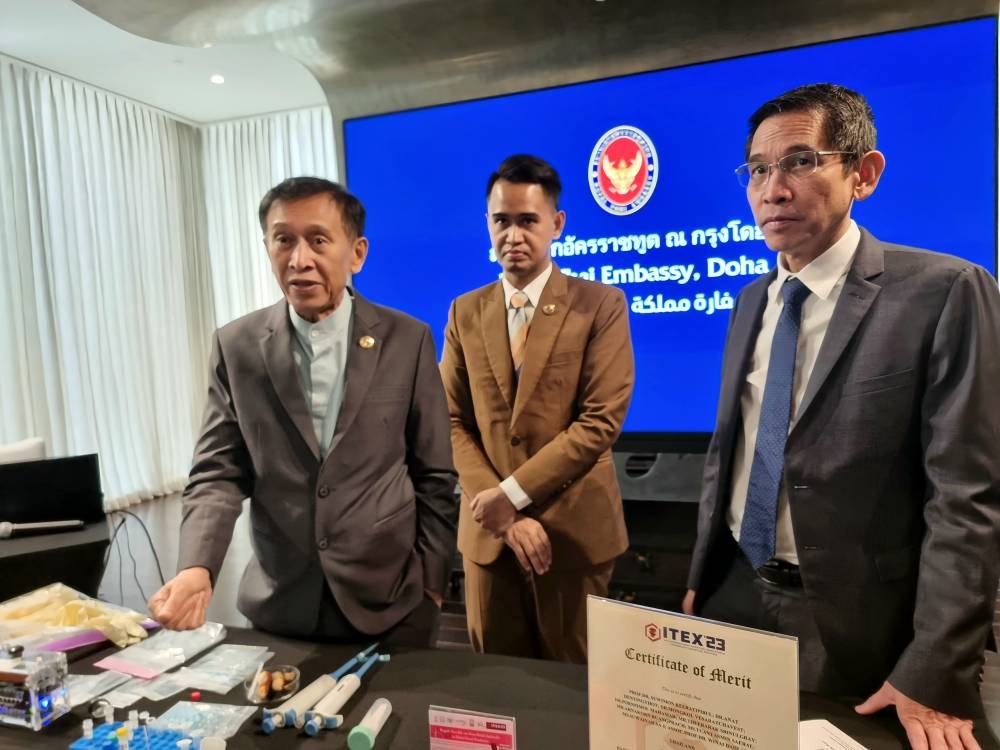A seminar, organised by the Thailand embassy in Doha yesterday (September 14), provided in-depth insights into Halal practices and technological innovation, highlighting the pioneering work of the Halal Science Centre (HSC) at Chulalongkorn University.
The event, titled “Thailand's Shariah-Compliant Advancement,” shed light on the importance of science, technology, and ground-breaking developments in Halal authentication.
Speaking at the event, Thai ambassador Sira Swangsilpa said the seminar carries a significant weight for both Qatar and Thailand, marking the start of a series of initiatives aimed at disseminating Thailand's exemplary practices and facilitating networking opportunities with diverse institutions and diplomatic entities in Qatar.
“This initiative seeks to unlock untapped collaborative potential between Qatar and Thailand, simultaneously offering prospects for trilateral cooperation with your respective countries,” he told attendees, which include a number of ambassadors and diplomats from different embassies in the country.
Beyond Thailand's renowned cultural diversity and tourist destinations, the envoy underlined the vibrant Islamic culture ingrained in Thai society with around seven million Muslims, constituting 10% of its population.
He noted that this community played a vital role in Thai society for centuries, dating back to the 17th century when Arab and Persian merchants served as advisors in the Royal Court.
“In contemporary times, the Royal Thai government has made significant strides to accommodate the religious values of this cherished population, fostering initiatives to ensure top-notch services and spiritual consumer protection for Muslims,” Swangsilpa said.
Established in 2004 under Thailand's leading university, he added that HSC is recognised as the world's first Halal Science Institution and operates as a state-of-the-art laboratory utilising advanced scientific methodologies to detect forbidden components and ensure the production of Halal food and services.
In addition, Swangsilpa said HSC offers extensive training for food technology professionals and has received recognition and awards for science and innovation, both domestically and internationally.
In his presentation, Associate Prof Dr Winai Dahlan, founding director of HSC and vice chairman of the Central Islamic Council of Thailand, underlined Thailand’s strategies on Halal integrity with science and technology.
Citing a scandal involving intricate Haram contamination in Halal food within a prominent Muslim nation like Indonesia, he stressed that Thailand's National Economic and Social Development Council recognised the critical role of science and technology in the production and certification of Halal food. This, he added, also extends to safeguarding the interests of Muslim consumers, a focus that had previously been advanced at the Faculty of Allied Health and Sciences, Chulalongkorn University.
Following Dr Dahlan’s keynote address, Dr Anat Denyingyhot, assistant director at HSC, conducted a live demonstration of the Rapid Test Kit for contaminating non-Halal animals in Halal food products. Highlighting the key role that the Halal Forensic Laboratory plays, he explored how Halal sciences ensure consumer protection through a combination of science and Shariah principles.
Dr Denyingyhot said that such innovation, which was awarded a gold medal at the 34th International Invention, Innovation & Technology Exhibition (ITEX 2023) in Kuala Lumpur, Malaysia in May this year, showcased the centre’s commitment to ensuring the highest Halal certification standards.
The seminar also highlighted Thailand’s National Strategy Framework, which aims to strengthen the economy and promote sustainable investments that address food security, climate change, and demographic shifts.
According to Swangsilpa, the emphasis on balanced development and environmental responsibility aligns with Qatar’s National Vision 2030, creating potential avenues for collaboration.
“I firmly believe that this seminar aligns seamlessly with the Qatar National Vision 2030, which revolves around four interconnected pillars of development: Human, Social, Economic and Environmental. It sets a clear roadmap for the country’s future while addressing societal needs and maintaining a delicate balance between modernisation and tradition preservation.
“This alignment is a perfect match with Thailand's national development goals and several national agendas from your respective countries. By combining our countries development objective, we can chart a promising path to collaboration and a brighter future,” the envoy said.

Dr Anat Denyingyhot conducts a demo of the Rapid Test Kit.

(From left) Dr Winai Dahlan, Dr Anat Denyingyhot, and Thai ambassador Sira Swangsilpa at the seminar, held in Doha on Thursday. PICTURES: Joey Aguilar.

